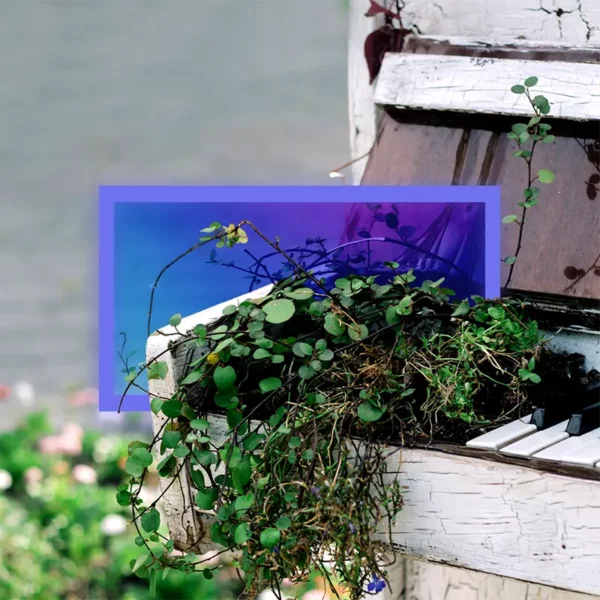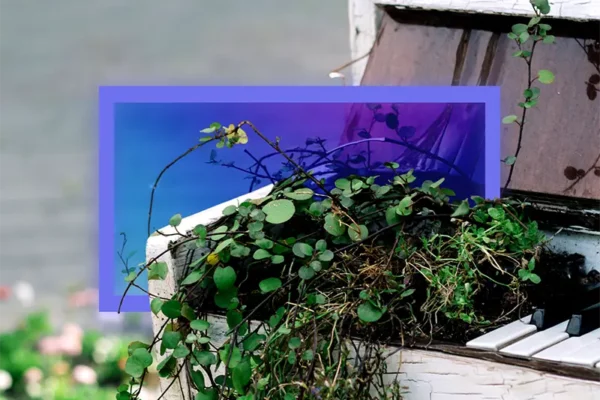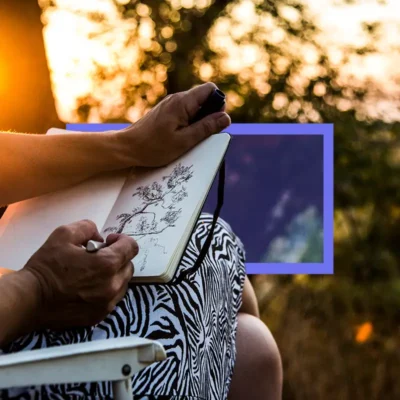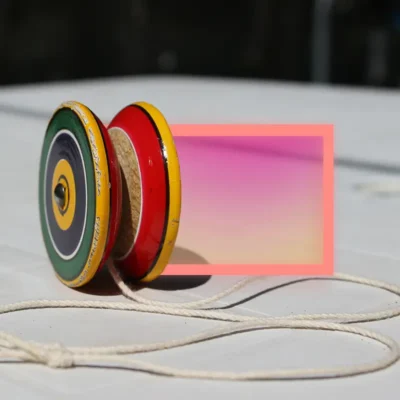What holds the world together
As a young girl, mowing her neighbor’s lawn in the Kentucky heat, SG Goodman learns many important things: how to avoid running into the chain-link fence, the art of blowing the grass away from the house … and the way these small, regular acts of community become the glue holding the world together. In caring for Miss Betty across the street, and in caring for the land her father farms, SG learns to love the world and its stories, its songs, its connections that sustain us.


Table of Contents:
Transcript:
What holds the world together
SG GOODMAN: I am not good at drying tears or offering hugs. I would rather be out pruning azaleas. But I learn there’s two things that soothe Miss Betty. One is petting my dog, Lizzybell, who I bring over for visits. And the other is when she sits at her piano and plays old country songs for me.
So I ask her to do that a lot. No matter how weepy or lethargic she is one moment, the next she can pop up and play full songs out of the chord book. Her voice is screechy, and the piano is out of tune, but it’s a kind of miracle all on its own to me, watching this music suddenly flow out of her.
ROHAN GUNATILLAKE: Singer-songwriter SG Goodman released her debut album, “Old Time Feeling” last year to widespread critical acclaim. Born to a family of row-crop farmers in the Mississippi Delta, she sings about the struggles of farming families in America’s rural south.
In this episode of Meditative Story, SG finds unexpected inspiration early in life caring for the eccentric old woman across the street. It’s a striking story about the web of obligations common in small towns, and how those obligations become something larger.
In this series, we combine immersive first-person stories and breathtaking music with the science-backed benefits of mindfulness practice. From WaitWhat this is Meditative Story. I’m Rohan, and I’ll be your guide.
The body relaxed. The body breathing. Your senses open. Your mind open. Meeting the world.
GOODMAN: There’s an oak tree in Miss Betty’s front yard, and no trees out back – just a little blue tool shed with wasp nests in the eaves. In my family, when you reach the age of 10, you’re given your first job, other than farm chores: caring for Miss Betty’s lawn and her azaleas. My brothers and I start out with the push mower, and advance to a small Snapper riding mower, once we can prove we can drive it without running into her chain link fence, which I do on more occasions than I care to admit.
We learn the art of blowing the grass away from the house. We learn to drive slowly so the blade will cut evenly. And we learn that if we do a half-ass job on the details, there will be a price to pay when Daddy checks in on our progress. Miss Betty doesn’t care about how her yard looks. She says it looks nice no matter what we do. But we quickly learn that the yard better look like we care for Ms. Betty. That little portion of an acre better show my family’s gratitude to the Thomases for allowing my grandfather to become his own boss. And so we make sure that it does.
My earliest memories of Miss Betty are in her old farmhouse in the lower bottoms, before she moves across the street from us. The view from her old front porch is miles of Kentucky farmland, stretching until it meets this tall dirt levy holding back the Mississippi River. Even at five years old, I heard stories of how my grandfather helped build that levee. There are memories of my grandfather in every field and at every corner.
Like a lot of people born in the Great Depression, my grandfather has to leave school for work. He never made it past the sixth grade. But he’s a skilled farmer, with a natural feel for the land. He gets his start working as a farmhand for Miss Betty’s father, Mr. Thomas. And in the 1960s, my grandparents and their five children take up residence in a small little farmhouse on the Thomas’ property. One morning, my grandfather calls out all of his kids from the house so he can fire a shotgun into the side of the house to pave way for a pipe to deliver his family some indoor plumbing. I come from modest yet innovative lineage.
When Miss Betty’s father decides to retire, he sells my grandfather his farming equipment so he can become a proper sharecropper. My grandfather plants the corners, which is to say every square inch of land gets utilized. This is the beginning of my father’s destiny to become a farmer himself, and, in consequence, my being born a farmer’s daughter and learning from a young age the value of caretaking neighbors like Miss Betty.
GUNATILLAKE: We’re all part of a lineage, a flow of people and decisions and circumstances over time. Is there anyone in your recent lineage that you have fondness for, whose life led to yours? Bring them to mind. What qualities of theirs do you wish to pass on?
GOODMAN: Plants equal money, so in the spring my brothers and I plant our own rows of sweet corn that we will harvest for school supplies. Farming is, and has always been, a rough way of living. The unforgiving nature of the sun and the pests met in the bean rows forge kinship among whoever is working beside you. Luckily by the time I’m old enough to work the fields, technology allows for way more comfortable conditions, like an air conditioned tractor, powered steering, or chemicals that make hand chopping weeds a rare event.
My father often reminds me of the differences between my experience working on the farm and his. My brothers and I are never respected in the same light as those who chopped beans or picked cotton beside my father as a child. But we still handpick the corn in the late June heat and gather driftwood from hundreds of acres when the river falls. Many other folks who worked alongside my father in those earlier days would not be as fortunate as he became. So I watch my father lend a hand to his neighbors, especially those who shared the labor of his youth. And sometimes hungry neighbors would join us at our long wooden table for supper.
No man is self-made, my father would remind us all the time. Taking care of our neighbors is an expected part of my life, as much as tithing on Sundays or brushing my teeth. But a person isn’t born with this understanding, it is taught – and in mine and my brother’s cases, either by religious indoctrination or the welts left from small cane poles that you have to cut yourself off of a slew bank. But few neighbors are handled with such care and loyalty as Miss Betty. What her family did for us entitles her to a lifetime of being a kept woman.
I remember her husband, Mr. Sonny. And until I am five years old, we sometimes visit them at the old homestead in the lower bottoms that my uncle still farms today. It is obvious that Mr. Sonny is sick, dying of cancer. He has yellow eyes from jaundice, and his liver is failing. He lies on the couch, frail. That’s where he is when he tells my dad that he is going to buy the house across the street from us, for Ms. Betty. It’s an understanding that we will keep an eye on her. “Take care of Betty,” says Sonny, before he dies.
Miss Betty’s new house is really close to ours, so close I could shoot it with a BB gun from my front yard. And when I turn 12, I start helping with the chores inside of her house. My mother pays me to do it, but I also understand that it is more than just a job – it is a family responsibility. I actually like to clean, but I’m not prepared for the mess that one lady can make.
It’s a modest house, brick outside and carpeted inside. And although it’s small, there is no getting ahead of keeping it clean. When I walk in after school, I immediately notice the smell of old food. Miss Betty does not do dishes. She does not do her own laundry. And in fact, she does not do her own grocery shopping. I walk her weekly grocery list over for my mother to fetch from the store. One package of P&P loaf sandwich bread, only soft white, a 24 pack of Coca-Cola’s in the can, and a thing of Chips Ahoy soft batch cookies, sometimes even a can of soup. I bring all the groceries back to her house, then I scrub the dishes built up in the sink, vacuum the floors, and do anything else that needs to be done.
Miss Betty wears a blue house dress, or sometimes the same clothes I laid out for her a couple of days ago. But when she gets fixed up to go into town, she still looks like a million dollars with her gray hair curled in a tight perm, bright blue eyeshadow highlighting her really blue eyes, and enough costume jewelry to weigh anybody down. My grandmother tells me stories about Miss Betty’s family having more money than most people during the Great Depression. The proof is in the pictures all around the little house. In one of them she’s next to her sisters, they’re all wearing lacy cowboy boots, store-bought dresses, and matching cowboy hats. By contrast, one of my grandmother’s few photographs from that same time is a frayed snapshot of her in clothes donated by the Red Cross, a black and white time capsule like a Dorothea Lange Dust Bowl portrait.
Young Miss Betty makes it all the way to high school. According to my grandmother, once she gets there, she has some sort of mental breakdown, panic attacks. The rumors are that she got shock therapy from a psychiatric ward in Bolivar, Tennessee.
I don’t know how the experimental treatments or the piles of pill bottles change the woman who is now in my care. All I know is that Miss Betty seems to need more of my attention than my baby brother does. She cries a lot, and she’s not too good at taking care of herself. Sometimes she talks about her nerves. I’m not sure what that means, but I know I wonder about my own nerves too, because sometimes I don’t feel calm inside.
I don’t come from an emotional family. And I am shy, but knowing about Miss Betty, and being told to always respect her, makes me learn that everyone has a story, and they are stories that we should honor. So I try to listen when she cries about missing Mr. Sonny. Sometimes she laments her mind not feeling good that day. Sometimes she tells me she’s not sure her sisters love her anymore.
GUNATILLAKE: The mind is a confusing thing. Can you see SG sitting there with Miss Betty, listening to it all? Let’s echo how she is: attentive, open, soft.
GOODMAN: I am not good at drying tears or offering hugs. I would rather be out pruning azaleas. But I learn there’s two things that soothe Miss Betty. One is petting my dog, Lizzybell, who I bring over for visits. And the other is when she sits at her piano and plays old country songs for me. So I ask her to do that a lot. No matter how weepy or lethargic she is one moment, the next she can pop up and play full songs out of the chord book. Her voice is screechy, and the piano is out of tune, but it’s a kind of miracle all on its own to me, watching this music suddenly flow out of her.
With a blue nightdress on, she bangs away chords and sings out of pitch to the hits of Lefty Frizzell, Hank Williams Sr., and Patsy Cline. These are some of her favorites, and they become some of mine, too. Miss Betty tells me about seeing the country legends of her day performing in the middle of bean fields, and how one time she took a train to Union City, Tennessee, to watch Jerry Lee Lewis in a school gymnasium. I find a compilation CD of country classics and bring my CD player over for her to listen to. It’s not as selfless as it sounds, since I really can’t take much more of her warbling.
But now for a few hours a week, Miss Betty seems happy, which eases my burden. I replay those songs for her over and over as I clean house, not realizing how much the songs are becoming a part of me, too.
Back in my own girlhood room full of Space Jam memorabilia, I lie on my quilt on a humid summer evening. I start listening to the same songs Miss Betty played on the piano. Gazing at the glow-in-the-dark stars on my ceiling, I am entranced by the storytelling of the older music. I am learning to listen to the lyrical stories, the way I am learning to listen to Miss Betty’s. And the narratives of heartbreak and struggle, they are everywhere. They reverb in the music. And the reverb in those old albums is very special: it comes through in the warmth and the raw quality of the sound. Later I learn it’s because they were recorded on old tube mics that I will soon covet as a musician. I love playing Etta James and Irma Thomas and others, not country necessarily, but I am chasing a sound that speaks to my soul. It is the sound of story.
Some evenings when I’m free of my chores, I go with my father to check on our newly planted fields. We walk out a ways together, until he has us stop at a spot of his own calculation. He bends down and takes out a pocket knife to dig in the dirt, uncovering a seed just beginning to sprout. I watch as he foretells the future of an entire field with such a small act. He knows exactly how much rain needs to fall to make a plant grow, and he knows when it’s likely to happen.
He adjusts his cap and looks out across the new field, squinting his eyes against the slanted light. He says, “This patch of ground is just holding the world together.” I am mesmerized. As a farmer’s daughter, it feels true to me in its simplicity, on some sort of scientific level. But I know he’s also talking about the fragility running under our way of life, the way you can build something from nothing, and it can still crumble away. We need both: the land and the people together. That creates all I know of the world, and for me, that world holds tight.
In my 20s, I have my own struggles with mental illness. Anxiety sometimes feels like it will overtake me. People often interpret one of my songs, “Space and Time,” as a love song, but it’s actually a goodbye song. I write it when I am in a terrible state of thinking about leaving this world. I have written the chorus, but not the central verse. I am at a friend’s house, and my drummer comes over. We start playing through the chords, me on the guitar. I take out the legal pad, and the lines start to come to me. And I begin to climb out of my own anguished head.
Like Miss Betty, I know that music can be both healing and a helpful escape. Not just the listening but now the writing, too. One thing I can do is write about the human condition. And I can do it because I witnessed it so early, through that web of obligations that builds intimacy between neighbors even when you don’t seek it.
This is my ode to Ms. Betty, to loyalty, and to tradition, to learning how our obligations knit us together for a reason. Our worlds are held together and even created by those we spend our days with. When we are young, those people we care for and who care for us mold us and help us grow, leaving traces deep enough to influence our future, or maybe even the future of generations of a family.
You might have a Miss Betty, or you may be a Miss Betty for someone else, forging an unexpected connection – maybe even a lifesaving one – in what might seem like an everyday circumstance: mowing the lawn, picking the corn, petting a dog.
Those moments might be quiet, or, if you’re lucky, they might be filled with some old piano notes and the sound of a human voice, singing.
Rohan’s closing meditation
GUNATILLAKE: I loved how SG talked about music as both healer and escape. About the value of just listening and the value of writing, or in Miss Betty’s case, singing.
So let’s use that as the thread to pull on for our short practice together. And to start I’m going to invite our wonderful composer Ryan to start playing some of the music from the episode.
Thanks Ryan.
And what I’m inviting you to do is just listen.
Body soft. Face soft. Listening. Hearing. Receiving. Being a receiver. No need to go out to the music. Nothing to go and get. Just letting the sound, the music, come to you.
This is a training. Practicing with the lovely, so that when we need to practice with the less-lovely, we have the skills. So what we’re doing here is allowing experience to just be known.
Learning how to leave things alone, to be spacious. Learning to drop the need to always be reacting, be commentating.
If we can do it with music, note by note, then when something arises in our mind that we’d rather not spin into reactivity with, we’ll have that little bit of a better chance. So, we practice listening, just listening. Receiving.
Thank you Ryan.
So Miss Betty sang. And SG writes. So let’s switch from listening to singing and writing. And what that means for us in mindfulness practice is to just acknowledge what is happening within us. And name it.
You can sing it out like Miss Betty if you like, saying words that match your experience. Or for a quieter approach like SG, you can just note them to yourself. Again no need to commentate on what your experience is. Just knowing it. And noting it. Or singing it.
There was a lot of beautiful imagery in SG’s story. Relationships from our past, reaching out to cultivate qualities in our future. Planting every corner to get the most out of the land. The simple intimacy of one human being present and attentive to another.
So as we start to close, choose your own favorite theme of today’s story, the one that is with you now. And just enjoy it. Letting it make its meaning.
Thank you SG. Thank you Miss Betty. And thank you. Almost halfway through the year. You’re doing great, you know.





